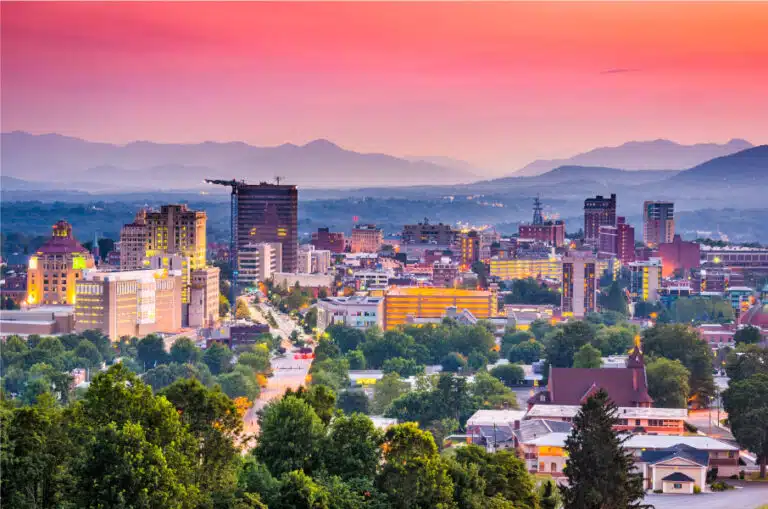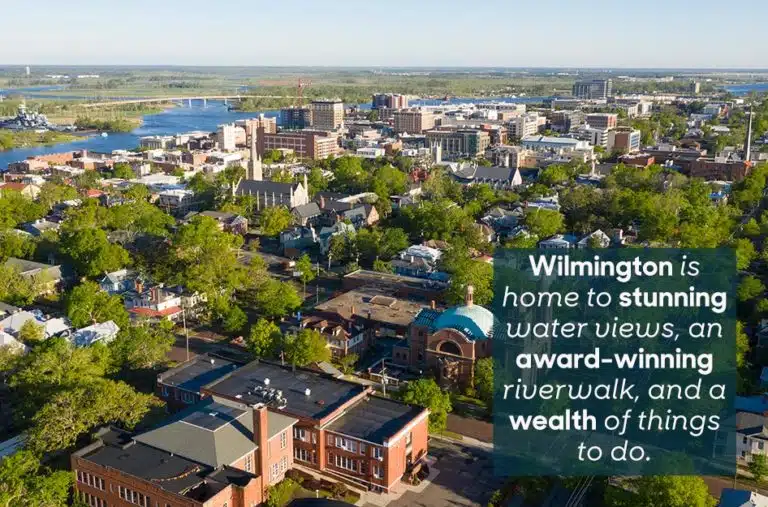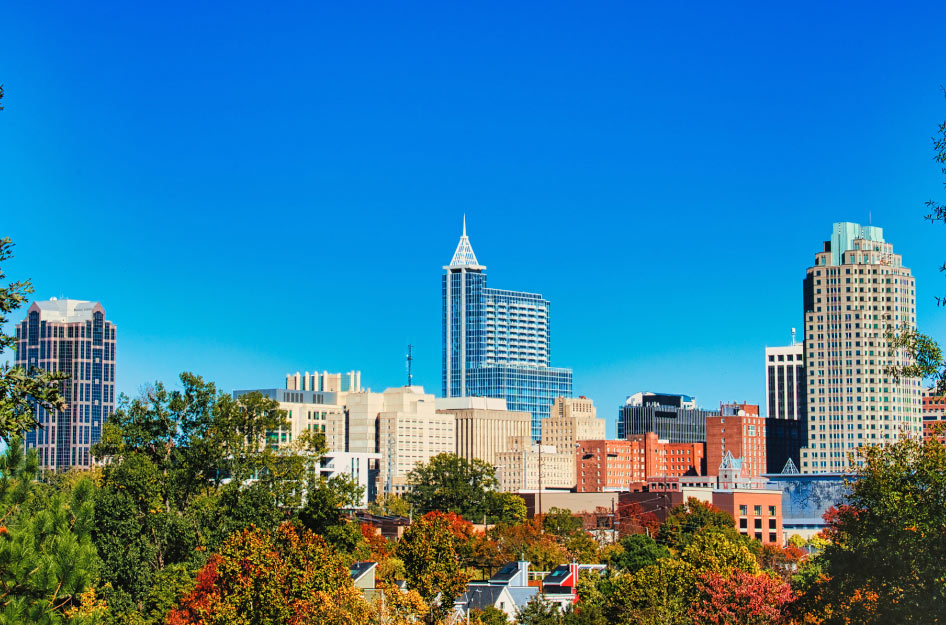22 Pros and Cons of Living in North Carolina: From the Coast to the Smokies
North Carolina

Making the decision to call North Carolina home might sound like an easy choice. In fact, it’s the No. 2 state people are moving to in 2025, with a population that’s steadily grown over the past five years to more than 11.2 million. Notably, the regions around the best Charlotte neighborhoods and the best Raleigh neighborhoods reported the highest net growth in the state. But just like in any other state, there are pros and cons of living in North Carolina that you’ll need to consider before packing up and actually moving to North Carolina yourself. From the mountains to the beaches and everything in between, we’ve got the lowdown: 22 pros and cons of living in the Tar Heel State. First, some fun facts.
| Thinking of moving to North Carolina? Start by getting a free moving quote from PODS. |
Fun Facts You Should Know About North Carolina
- North Carolina’s nickname, the Tar Heel State, comes from the state’s tar manufacturing industry for naval vessels in the 1700s and 1800s.
- On March 7, 1914, Babe Ruth hit his first ever professional home run in the North Carolina city of Fayetteville — and it’s also where he acquired the nickname “Babe.”
- The NASCAR Hall of Fame is in Charlotte, the capital of North Carolina.
- Parts of the Great Smoky Mountains National Park and the Blue Ridge Parkway are in North Carolina.
- Along the Atlantic Coast, you’ll find the Outer Banks, home to the tallest brick lighthouse in the country: The Cape Hatteras Lighthouse.
Should I Move to North Carolina? — FAQs
Q: Is North Carolina a good place to live?
A: Absolutely! Residents would agree that the definition of a good life is living in North Carolina. That means a reasonable cost of living, a vibrant culture, and plenty of recreational opportunities. The Tar Heel State has all that and more.
Q: Is it cheaper to live in NC or FL?
A: Florida living is just a smidge more expensive (0.5 percent) overall than North Carolina living, with a few notable digressions: Groceries are 4.2 percent higher in the Tar Heel State, transportation is 4.3 percent higher, and childcare is a whopping 23.6 percent higher. But again, the overall cost of living in North Carolina is a bit lower.
Q: What is the salary needed to live comfortably in North Carolina?
A: The income you need to live comfortably depends on where in the state you live, your lifestyle, and your family size. But in general, living in North Carolina requires about $105,400 in pre-tax salary for a family of four with two working adults. Note: That’s just to maintain the standard of living. To live comfortably as a family of four, apply the 50/30/20 rule (50 percent of income goes to necessities, 30 percent for “wants,” and 20 percent for savings and paying off debt). Applying that formula for a family of four with two working adults, living comfortably in NC means an income of about $210,800.
Q: Is North Carolina a red or blue state?
A: The Tar Heel State is considered “purple”: a swing state that votes for both Democrats and Republicans, depending on the part of the state and the office. In 2025, the state leans more red —- but the governor is a Democrat. The two U.S. Senators are Republicans, the legislative delegation comprises 10 Republicans and four Democrats, and the state went with Republican Donald Trump for president with 51 percent of the vote compared with 47.8 percent for Democrat Kamala Harris.
22 Pros and Cons of Living in North Carolina
Is it a good idea to move to North Carolina? We think so. Whether you’re after abundant green spaces in the mountains or a seaside lifestyle along the Atlantic Ocean, you’ll find it in the Tar Heel State. That said, of course, no place is perfect. There are definitely pros and cons of living in North Carolina to be aware of before moving, and we’re here to take you through 22 of them.

Moving to North Carolina means hiking and exploring for many residents, and in certain towns — especially Rodanthe — you have access to some of the state’s best outdoor locations.
1. Pro: The Tar Heel State Is a Dream Come True for Nature Lovers
At the top of the list of North Carolina pros and cons is the great outdoors. There are over 40 state parks, 10 national park sites, and four national forests — including the Great Smoky Mountains and the Blue Ridge Mountains. There are also seven state lakes and four state rivers. These beautiful outdoor hot spots provide plenty of activities for everyone, including swimming, biking, camping, and kayaking.
Hiking is a popular pastime in North Carolina, especially in towns like Asheville. Known for its access to some of the state’s best outdoor destinations, Asheville’s trails link hikers to places like Mount Mitchell and Craggy Gardens. The coastline of North Carolina stretches for more than 300 miles, with nearly endless options of world-class beaches. The variety of gorgeous locations includes the vibrant port city of Wilmington and the beautiful Outer Banks. But really, all the best places to live in North Carolina are within easy reach of beautiful destinations.
2. Con: It’s Also Prone to Natural Disasters
Among all the pros and cons of living in North Carolina, this con is perhaps the most worrisome.
Because the state is on the coast, it isn’t unusual for hurricanes to hit North Carolina — in fact, the average landfall is every one to three years. Other storms the state endures from time to time include mountain blizzards in the winter. The result of these disruptions, besides tragic loss of life and property, includes the need for additional — and increasingly higher-cost — insurance coverage. So, given all that, is North Carolina a good place to live? You’ll need to weigh all the considerations that matter to you to make your decision.
3. Pro: You’ll Find an Affordable Cost of Living in North Carolina
It’s not the cheapest state in America, but living in North Carolina isn’t the priciest, either. The cost of living is relatively comfortable with a score of 91, which means it’s nine percent lower than the rest of the country.
4. Con: The Housing Market Is Pricey
The current average home price in the state is around $332,700, a .8 percent decrease from 2024. If you’re looking for more affordability, your odds might be better in one of the best small towns in North Carolina. Here are just a few where average home prices are lower than the overall North Carolina average:
5. Pro: Diverse Communities Create a Rich Culture
North Carolina has a diversity score of 71 out of 100. The Raleigh-Durham and Charlotte areas, in particular, are considered some of the most diverse in the state, with generations of locals mingled with transplants from other states and countries, all contributing to the rich fabric of the community. This alone is enough to make both metros some of the best places to live in North Carolina.
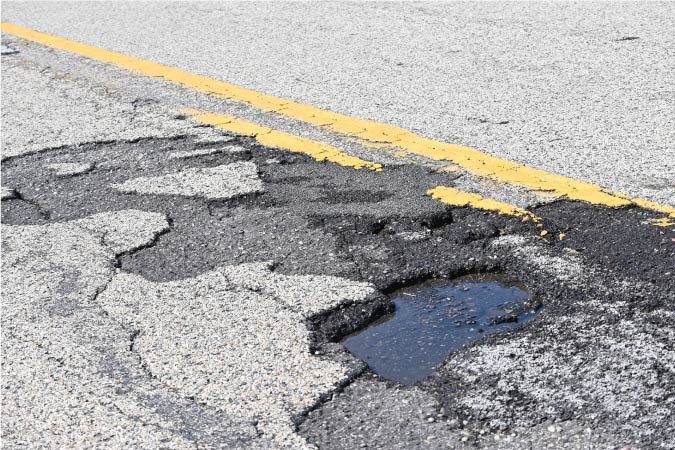
The state’s infrastructure is considered to be among the worst in the nation — something you should consider along with the benefits of living in North Carolina.
6. Con: Poor Roads and Infrastructure Quality Are a Challenge
Infrastructure isn’t one of the Tar Heel State’s strong suits. Even before Hurricane Helene changed the landscape of Western North Carolina in 2024, roads and bridges throughout the state were in need of upgrades. As leaders debate the best way to solve these critical needs, folks living in North Carolina (and especially those considering moving there) should examine the challenges to figure out areas that need support, plus the solutions being put in place, so they can determine what’s best for their families.
7. Pro: Mild Weather Mostly Dominates Year-Round
There are, of course, exceptions when arctic fronts or tropical systems make their way through the state, but in general, the climate in the Tar Heel State is mild and temperate — another reason moving to North Carolina is so popular. The average temperature is about 50 degrees in winter and 80 in summer. Snow is common in the mountains, particularly around the state’s ski resorts. And along the coast, of course, a nice sea breeze keeps things mostly comfortable year-round.
9. Pro: Lots of Highways Make It Easy To Get Around
What NC lacks in transit, it makes up for with highways — not the most sustainable approach, but you can get around easily if you’ve got wheels. And there’s no shortage of spectacular destinations in pretty much every direction.
For instance, the 252-mile trip along the Blue Ridge Parkway (still under repairs in some spots due to damage from Hurricane Helene — check before you go!) winds through some of the most stunning scenery in the country. From the mountains of Western NC, hop on I-64 and in five hours you’ll reach the Outer Banks National Scenic Byway. And with I-95 running north to south through the state, you’ve got pretty much a straight shot up to New York and down to Florida.
10. Con: Icy Roads Make It Difficult To Get Around
If you’re a transplant from up north or the Rocky Mountains, you might roll your eyes at this section, but put on the brakes for a minute and hear us out. Temperatures in the winter here can vary a lot, and ice on the roads is more common in this state than you might think — especially, of course, in the hills of Western North Carolina. Thankfully, the state is prepared with salt trucks and other equipment to mitigate the risk for drivers. But it’s still a good idea to stay home in dicey winter weather.

If you're a fan of barbecue, then you're probably already aware of the can’t-miss BBQ scene — the tastiest of all the pros and cons of living in North Carolina.
(Source: Skylight Inn BBQ via Facebook)
11. Pro: Carolina Barbecue Joints (and Other Tasty Treats) Are Everywhere
Few disputes are as long-running and heartfelt as the battle over Carolina barbecue: Which style is best — North or South? Whatever your preference, there’s plenty to go around in the Tar Heel State. The mothership is generally agreed to be Ayden’s Skylight Inn, a favorite since 1947, and there are dozens and dozens of other options statewide.
Vegetarians need not despair. The foodie scene in North Carolina has grown immensely in recent years, particularly in cities like Asheville (do not miss the dining experience at The Biltmore), Raleigh, and Charlotte. The state is also home to more than 170 breweries.
12. Con: Public Schools Rank Relatively Low (With Exceptions!)
Unfortunately, the public education system for K-12 students has many challenges. The state is ranked 31st in the nation, based on factors like student-teacher ratio, ACT and SAT scores, and graduation rates. So, given these issues, is North Carolina a good place to live for families with kids? Short answer: Yes.
For starters, there are pockets statewide of highly rated schools. According to Niche, Union Elementary in Brunswick County is the No. 1 Standout Elementary School in 2026, and the North Carolina School of Science and Mathematics, in Durham, takes the top spot for Best Public High School in the nation.
13. Pro: Stellar Colleges and Universities Create a Vibrant Culture
You’ll find some of the best schools in the nation here, including Duke University (ranked No. 7 nationwide), North Carolina State, and the University of North Carolina at Chapel Hill — all part of the culture fueling innovation in places like North Carolina’s Research Triangle Park. Schools also enrich the state with local performances, galleries, and creative programs that bring diverse ideas and talents to their communities.
14. Con: The Crime Rate Is Slightly High
This is a tricky metric to consider for the state in its entirety; after all, North Carolina is a massive state with varying socioeconomic populations among its 11 million residents. But according to NeighborhoodScout, the overall crime rate in North Carolina is a little lower than the national median. Your chance of being a victim of property crime here is 1 in 48, and the violent crime probability is 1 in 256. Prospective residents should weigh these figures among the pros and cons of living in North Carolina — and make their decision based on what’s right for them.
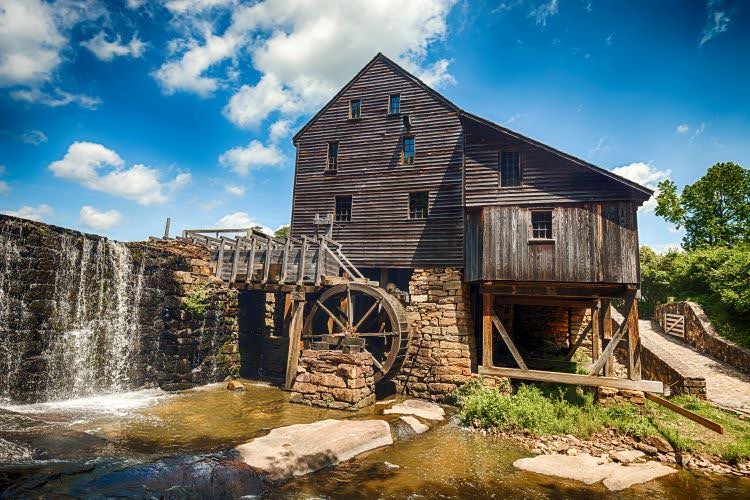
The pros and cons of living in North Carolina include a rich, varied history, including Yates Park Mill outside Raleigh, NC, which dates back to 1756, before the United States was formed.
15. Pro: History and Culture Are Alive and Well
Museums across North Carolina commemorate the state’s rich past from the Civil War to the Civil Rights Movement. The North Carolina Museum of History in Raleigh and the Levine Museum of the New South in Charlotte are two must-visits. In Greensboro, the International Civil Rights Center & Museum honors the pivotal sit-ins of the 1960s. And on the coast, the Wright Brothers National Memorial in Kitty Hawk celebrates the first powered flight in the U.S.
16. Con: Traffic Is Messy in North Carolina’s Larger Cities
You can’t discuss the pros and cons of living in North Carolina without touching on traffic. It’s one of the byproducts of growth, unfortunately, and a lack of significant public transit. The congestion in North Carolina's larger areas, such as Raleigh and Charlotte, is becoming more problematic due to the state's growing population. As is common for residents of metro areas nationwide, commuters to school or work should stay on top of traffic and potential road closures, prepare for delays, and — just to be safe — leave early.
17. Pro: Sports Fans Are in Heaven
Moving to North Carolina as a sports fan is a treat. With nine NCAA Division 1 teams, fall football Saturdays across the state are taken very seriously. On the pro side, the Panthers call Charlotte’s Bank of America Stadium home. For soccer, head over to Bank of America Stadium to catch the Charlotte FC in action, and there’s also Hornets basketball at the Spectrum Center and Checkers hockey at Bojangles Coliseum.
18. Con: Liquor Is Under Lock and Key (Sometimes)
If you want to grab some spirits for game-day house parties, you’ll need to plan ahead: North Carolina is one of only four states that prohibit liquor sales on Sundays. You can have a Sunday cocktail in a restaurant or bar — but only after 10 a.m. The biggest inconvenience you might face is not being able to grab beer or wine during a grocery run, since those bevvies, like liquor, are sold only in state-controlled stores.

You can find the world's largest chest of drawers in High Point, AKA the "Furniture Capital of the World."
(Source: Worlds Largest Chest Of Drawers via Facebook)
19. Pro: Roadside Attractions Add Charm to the Landscape
Among the quirkiest pros and cons of living in North Carolina are the state’s roadside attractions. There are some destinations in North Carolina that you can’t find anywhere else in the country. For instance, the world's largest chest of drawers is in High Point, which honors the city’s status as the Furniture Capital of the World. The city hosts the biannual High Point Market, the largest home furnishings trade show globally.
20. Con: Weather Can Be Unpredictable
The weather in North Carolina is generally mild, but it can still be unpredictable. The state can experience varying weather patterns, ranging from loud thunderstorms to quiet, warm afternoons.
21. Pro: North Carolina’s Cultural Landscape Is Flourishing
The Tar Heel State is projected to become the seventh-most populous state in the U.S. by 2030, thanks in part to growing arts and cultural offerings. Among the benefits of living in North Carolina: Asheville was recently named the Nicest Place in America. Metro Charlotte is building a major new performance venue at Bank of America Stadium. And festivals celebrating NC’s arts and music are everywhere — from Greensboro’s North Carolina Folk Festival to Biscuits and Banjos in Durham.
22. Con: But with Popularity Comes Increasing Traffic, Crowds, and Other Annoyances
More festivals and venues mean more people and cars. Hopefully, the state will stay on track with infrastructure, public transportation, and other civic strategies for smart growth. And in the meantime, residents can always find respite in the beautiful North Carolina mountains — one of the biggest pros when you’re considering the pros and cons of living in North Carolina.

With beautiful outdoor amenities, great job opportunities, a delicious restaurant scene, and rich history to explore, the good times never end when living in North Carolina.
If Living in North Carolina Is in Your Future, PODS Can Help You Get There
There are pros and cons of living in North Carolina, but the good far outweighs the bad. With beautiful outdoor amenities, great job opportunities, a delicious food scene, and rich history to explore, the good times never end for folks living in North Carolina.
Whether you're ready to move to North Carolina right now or just want to take things slowly, PODS can help you get the job done with the right portable container sizes for your specific needs. PODS will deliver the container right to your driveway, where you can load your belongings on your own schedule. It will then be picked up and delivered to your new home whenever you're ready, with one month's storage built into the cost of every move. Need help with the heavy lifting? PODS can refer you to local pros for packing and loading assistance. Visit PODS online for a free local moving quote or call 877-350-7637 for your long-distance move.
Editor’s note: For ease of reading, monthly rental prices were rounded to the nearest $25 and home values were rounded to the nearest $100. Home values in the millions were rounded to the nearest $100,000.
*This article was written on behalf of PODS Enterprises, LLC (“PODS”). PODS does not warrant the completeness or accuracy of any information contained in this article and disclaims any liability for reliance upon the content herein.

Your quote in 60 seconds
Get pricing tailored to your needs!

